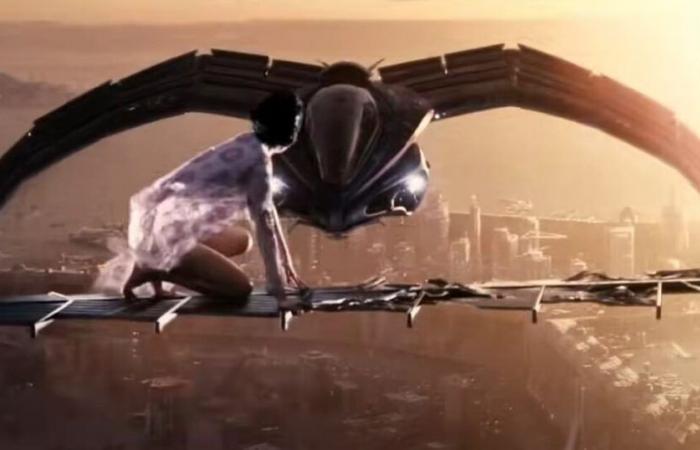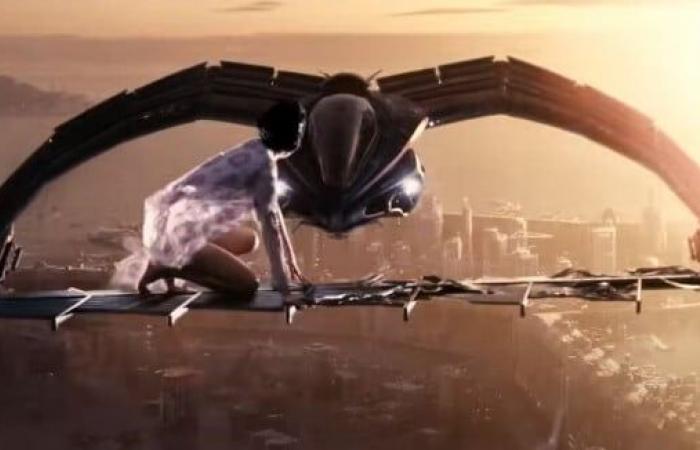The Wachowski sisters have made a name for themselves in science fiction cinema with hits such as The Matrix and Speed Racer. However, there is another film on which they were banking a lot and unfortunately, it did not have the success it deserves…
The Cloud Atlas trailer. © Warner Bros.

The rest after the ad
The Wachowski sisters are best known for revolutionizing science fiction cinema with Matrixa work that marked the entertainment industry with the same force as the meteorite that wiped out the dinosaurs.
However, few people know that a decade after this monumental success, they embarked on an even more ambitious project: the adaptation of a science fiction novel that many considered unadaptable: Cloud Atlas.
A complex novel that seduced Bill Gates
Cloud Atlaswritten by David Mitchell and published in 2004, is an ambitious novel that captivated science fiction critics and readers at the time of its publication. The story, which takes place across six different timelines, explores themes as varied as the quest for freedom, the connection between individuals and the repercussions of our actions over time. Its narrative structure is similar to a Russian doll, where each story fits into anothergradually revealing a complex and fascinating mosaic.
>> If you like science fiction, you have to see this hidden movie on Netflix!
Among the admirers of the novel, Bill Gates called it one of the best novels he ever read. On several occasions he praised Cloud Atlas for its deep thoughts on humanity and complex storylines that challenge the reader to think about the impact of our decisions. For Bill Gates, Mitchell’s work offers a unique perspective on how people’s lives are interconnected across time and space, which particularly resonates in today’s globalized context.
However, the idea of adapting such a complex novel into film did not seem like an easy task. The fragmented narrative and time jumps presented a challenge that many considered impossible to overcome. But the Wachowskis, along with German director Tom Tykwer, rose to the challenge, determined to bring this story to the big screen with all its power and uniqueness.
The titanic film adaptation
In 2012, the Wachowski sisters, in collaboration with Tom Tykwer, released Cloud Atlas. The film boasted an impressive cast including Tom Hanks, Halle Berry, Hugo Weaving and Susan Sarandon, among others. The adaptation retained the structure of six interconnected stories, spanning from the 19th century to a post-apocalyptic future. The same actors play different characters in each timelinea device that symbolizes the idea of reincarnation and the persistence of the soul through the centuries.
Producing the film was a monumental effort. With a budget of over $100 million, Cloud Atlas is one of the most expensive independent films in history. The Wachowskis and Tykwer directed the different stories simultaneously, dividing the shoot into two teams working in parallel. This ambitious approach was essential to maintaining the film’s narrative and visual coherence, as each story had its own tone, visual style, and cinematic genre, from historical drama to futuristic science fiction. But that wasn’t enough.
Despite its bold approach and impeccable technical execution, Cloud Atlas failed to reach the general public. Critics weren’t particularly enthusiastic either: some called it a pretentious failure, although over time it gained something of a reputation as a misunderstood masterpiece. Regardless, its box office results were disastrous. It only grossed $130 million worldwide, well below expectations.
The reasons why Cloud Atlas failed
The film’s failure can be attributed to several factors. First of all, its narrative structure was not easy for the general public to assimilate. Cloud Atlas is a work that requires constant attention from the viewer and a desire to connect stories that do not seem related at first glance. This complexity, which is precisely one of the virtues of the novel, has proven to be an obstacle for many spectators seeking a more direct and linear cinematic experience.
>> The most beautiful science fiction film of the 21st century is available on Netflix… An undisputed masterpiece that no one should forget!
Additionally, the film’s marketing campaign did little to attract the right audience. Presented as a science fiction epic, many viewers expected something closer to The Matrixwith fast-paced action and revolutionary visual effects. In reality, it was a deeply philosophical work, focusing on the emotional development of the characters and the repetition of the same mistakes throughout the story. The gap between audience expectations and the final product resulted in a cold reception at the box office.
Why did the Wachowskis think this film would be their masterpiece?
Despite its commercial failure, the Wachowskis thought that Cloud Atlas would be the work for which they would be remembered. They said the film represented the culmination of their ideals and narrative concepts, exploring themes they were deeply passionate about, such as identity, destiny and human connection. In interviews, the directors explained that Cloud Atlas was a statement of principle, a work that attempts to demonstrate that all our actions, even the smallest, have repercussions over time and affect people and places whose existence we do not even suspect.
The choice of such a complex and seemingly unadaptable novel demonstrates the Wachowskis’ commitment to a story that allows them to explore complex themes through unique visual storytelling and to view film as an art form that goes beyond simple entertainment. But the film’s failure actually dealt a major blow to their career. After Cloud Atlasthey moved on to a much more commercial project, Jupiter: The Destiny of the Universeanother sci-fi film that was also a huge failure and put their career on hold for years.
The legacy of Cloud Atlas
Although the film did not have the impact the Wachowskis had hoped for, it has won over fans over the years. Today, Cloud Atlas is considered by many to be a cult filmwhich is a testament to the power of cinema to explore complex stories and ask profound questions about the human condition. It has been reevaluated by critics and filmmakers, who see it as a demonstration of artistic courage, a reminder that cinema can also be a platform for experimentation and the exploration of ideas.
>> Over 14 hours and a budget of over $1.1 billion: a sci-fi show you can stream
In retrospect, the commercial failure of Cloud Atlas seems to be less an indication of its quality than a sign that it was a film ahead of its time. In a cinematic world where deep and diverse content is increasingly sought after, the Wachowskis’ vision has found a new audience who appreciate their message. Although they will always be remembered for Matrix, Cloud Atlas could be considered their most ambitious and fascinating work.
Article written in collaboration with our colleagues from 3DGames.








